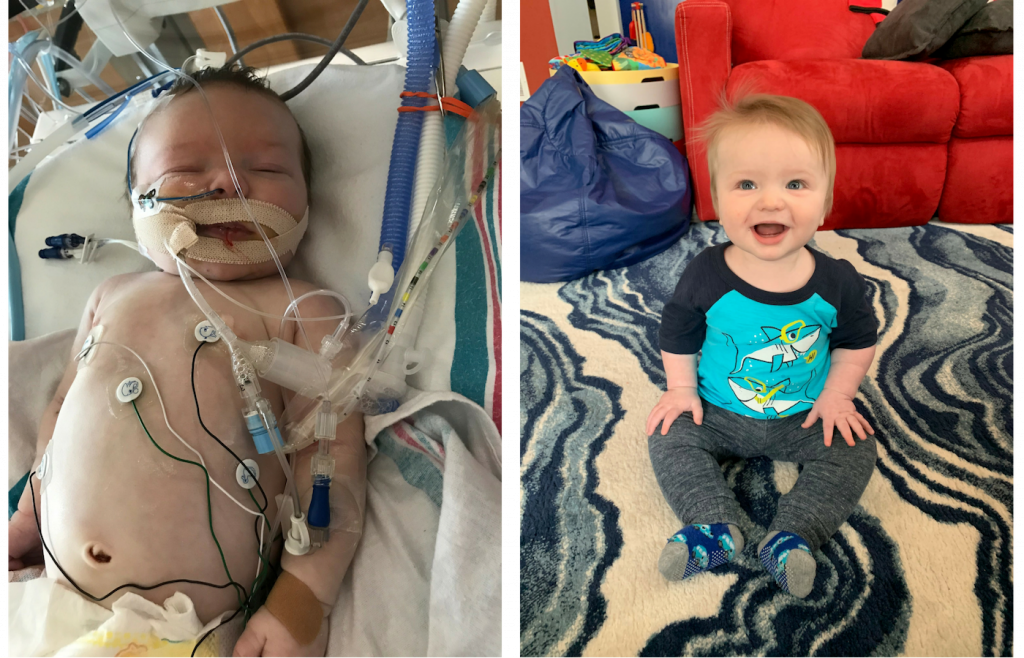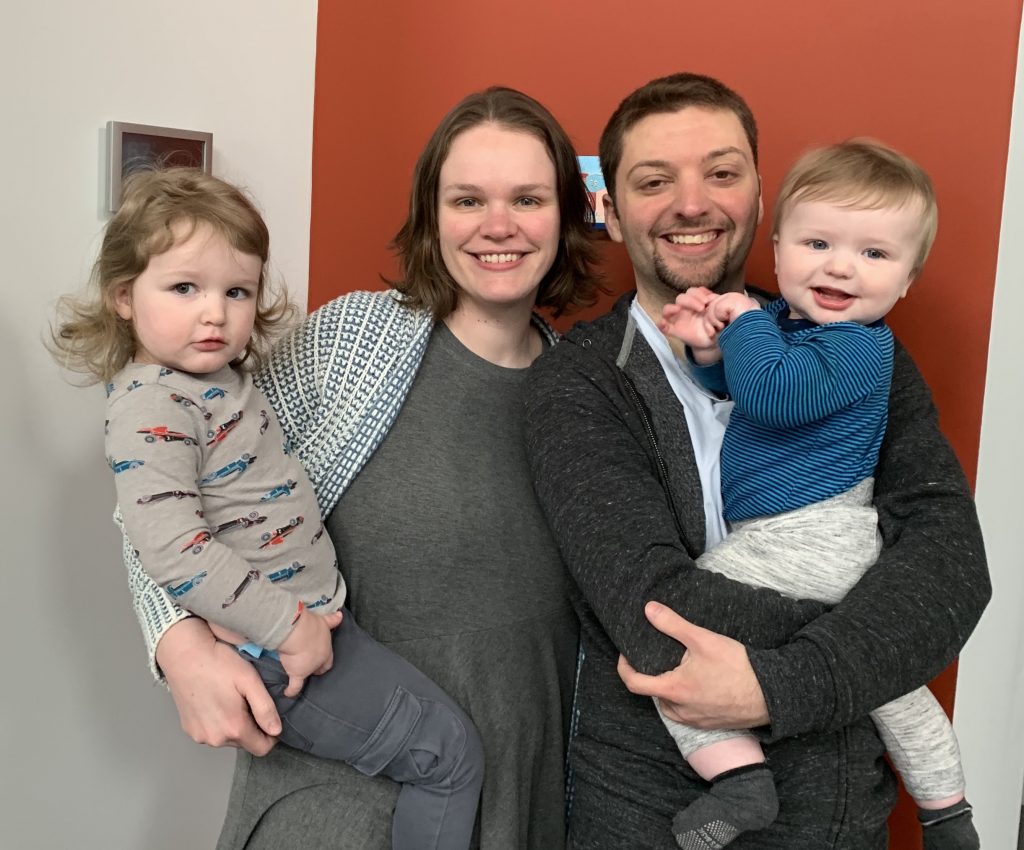Enzo’s Fight With Sepsis at Only 15 Days Old
April 23, 2019
 One night, John, an operations research analyst, and Lauren, a quality engineer, noticed that their 15-day-old son, Enzo, had a fever and wasn’t feeling well. They closely monitored him during the night. The next day when his fever continued, they rushed him to the hospital, unsure of what was causing his condition to worsen. They didn’t know it then, but Enzo had sepsis
One night, John, an operations research analyst, and Lauren, a quality engineer, noticed that their 15-day-old son, Enzo, had a fever and wasn’t feeling well. They closely monitored him during the night. The next day when his fever continued, they rushed him to the hospital, unsure of what was causing his condition to worsen. They didn’t know it then, but Enzo had sepsis
Now 9 ½ -month-old, Enzo is the honorary chair for the Rochester NY Sepsis Challenge. From their personal experience, John and Lauren hope to raise sepsis awareness by sharing Enzo’s sepsis journey with others.
We had the opportunity to interview John and Lauren Luranich about their journey with sepsis. There were many challenges that the Luranich family faced, but John and Lauren are both extremely thankful and appreciative for the nurses and doctors who handled treated their baby boy. To read their intimate interview, keep scrolling down.

Tell us about Enzo’s story. How did he develop sepsis as a newborn? When did you first realize something wasn’t right?
John and Lauren: When Enzo was 15 days old, he woke up during the night and seemed particularly irritated. We thought maybe it was just discomfort from something spicy Lauren ate, as this had happened with our older daughter. So Lauren spent the rest of the night awake with him sleeping on her chest. In the morning his temperature was 100.4, so the doctor on call told us to monitor it. After taking his clothes off, laying him on his belly, and trying to get him to take some Tylenol (more details on this in the response to question 6), he seemed a bit better. It wasn’t until he woke up after a nap in the early afternoon that he seemed even more upset and in worse condition. We took his temperature and it was 102.5, so we quickly rushed him to the pediatric ER at Strong. He was taken back immediately and they started working on him, eventually moving us up to the PICU. Because his heart was working so hard, they intubated and sedated him to calm him down.
He came off the breathing tube after 2 days and made a fairly quick recovery, thankfully. We were in the hospital for 12 days, though, to run out the course of antibiotics. After 5 days in the PICU we were moved to a regular floor for the remainder of the stay.
It turns out he had an e.coli infection, which stemmed from a kidney infection. In the hospital, they found he had hydronephrosis of one of his kidneys, and after we were referred to a urologist we discovered he has a megaureter [a dilated ureter], which is likely the underlying root cause of the problem.
What do you remember most about when Enzo was in the hospital?
John and Lauren: What stuck most with us the most was seeing him on the table in the ER and how hard he was working. We also felt helpless and could only hope that they’d be able to help him in time. There were quite a few issues with getting antibiotics from the pharmacy, resulting in a long delay before their administration. While the nurses did a great job handling the situation, it was clear they were anxious about getting the antibiotics as soon as possible. We had some really great nurses and doctors in the hospital, and we’re very thankful for them. One of the ER doctors came up to check on him a couple of days after we were admitted, and she said she was very happy to see how well he was doing because they were all worried about him down there. That really drove home how serious it had been.
Some better memories are being able to hold him and feed him for the first time since getting to the hospital, his last dose of antibiotics, when his PICC line was removed (even though he didn’t like that part), and when his older sister visited and walked around as if she owned the ward.
How has this affected you and your family?
John and Lauren: The hospital stay was extremely hard, both mentally and physically. We both stayed with him the first few days, but after that we took turns going home for the night to spend time with our daughter and get some sleep. Long-term, we appreciate every moment we have with him and our daughter even more, and don’t take anything for granted.
Enzo is the honorary chair for the Rochester NY Sepsis Challenge. How did this come about? What does this mean to you and your family?
John and Lauren: One of our friends is on the board for the event and she nominated Enzo, knowing his story. We’re honored that he has been chosen as the honorary chair, and we hope to help bring more awareness to sepsis. Lauren had known about the event for a few years now from seeing posts on Facebook, but now it connects on a personal level.
Like many children, Enzo is a sepsis survivor. How is he doing now? Are there any challenges that he is facing post-sepsis or will face in the future?
Thankfully it doesn’t seem that there was any permanent damage, at least none that we know of. He’s a happy, BIG, thriving 9 1/2-month-old and is hitting his milestones. The only lingering issue from this is the megaureter. We’ve had regular appointments to monitor it with ultrasounds and we’ll see what happens as he gets bigger. His last ultrasound in March showed a little improvement, so it seems he’s on the right track.
Do you have any advice for other families whose children are diagnosed with sepsis?
We can’t really think of any advice for families whose children have had sepsis since Enzo doesn’t seem to have any issues from it. For people who have not already dealt with sepsis, we would advise them to make sure they know the signs of sepsis (we did not) and act quickly. It comes on really fast and needs immediate medical attention. For how common it is, there is not enough knowledge/awareness of it.
Also, this is a key reason why you may have heard to not give Tylenol to babies under 3 months. We did give him a minuscule amount of Tylenol that morning, not understanding the underlying reason for not giving them the medicine. We figured the reasoning behind was more along the lines of the actual medication not being good for the baby, but in reality, it can disguise a serious, life-threatening condition like sepsis. While thankfully he was still able to be successfully treated, we do sometimes wonder if it would have been as bad if we hadn’t given him the Tylenol (he spit out most of the fraction of the dose we tried to give him, but still).


























